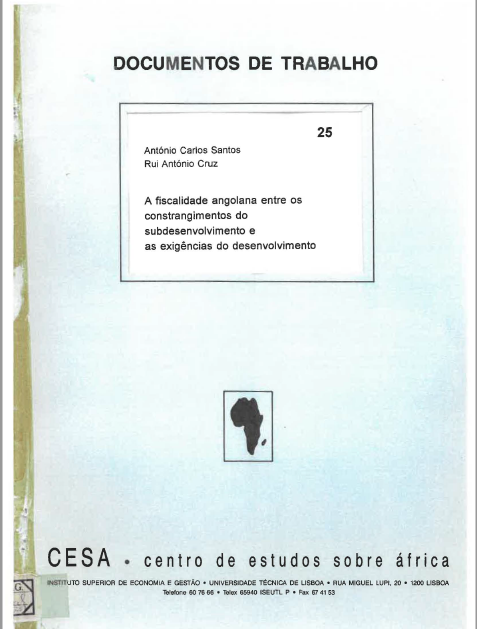Working Paper 25/1993: A fiscalidade angolana entre os constrangimentos do subdesenvolvimento e as exigências do desenvolvimento

Title: Working Paper 25/1993: A fiscalidade angolana entre os constrangimentos do subdesenvolvimento e as exigências do desenvolvimento
Author(s): Santos, António Carlos; Rui António, Cruz
Publication Date: 1993
Publisher: ISEG - CEsA
Quotation: Santos, António Carlos e Rui António Cruz. 1993. “A fiscalidade angolana entre os constrangimentos do subdesenvolvimento e as exigências do desenvolvimento”. Instituto Superior de Economia e Gestão. CEsA – Documentos de Trabalho nº 25/1993.
Abstract: The determining factor of Angolan taxation from the beginning of colonial times to the present day has been the permanence, albeit with different characteristics, of a situation of underdevelopment. In fact, the way in which the Angolan tax system has evolved is deeply marked by this reality. But if this is the main feature of continuity, other factors exist that allow the establishment of ruptures or discontinuities and thus legitimize the possibility of talking about different phases of the system's evolution. It has long been known that there is a strong correlation between the development process (socio-economic, political) and the structure and technique of tax systems. Several constraints arising from underdevelopment thus weigh on tax systems. Among them, the existence of small and poorly diversified tax bases, the difficulties in taxing real income, with permanent recourse to presumption methods, the unreliability of accounting systems, the almost always excessive weight of taxes on foreign trade can be mentioned. , the difficulties in administering taxes due to the lack of qualified personnel and technical, IT and logistical resources, with the consequent increase in tax evasion, the incipient tax awareness of taxpayers and the deficient juridification of the sector in its various facets (legislative technique, information legal, doctrinal elaboration, role of the courts, guarantees of taxpayers, etc.). Angola did not escape these characteristics.
Identifier: http://hdl.handle.net/10400.5/24200
Category: Working paper
Abstract:
The determining factor of Angolan taxation from the beginning of colonial times to the present day has been the permanence, albeit with different characteristics, of a situation of underdevelopment. In fact, the way in which the Angolan tax system has evolved is deeply marked by this reality. But if this is the main feature of continuity, other factors exist that allow the establishment of ruptures or discontinuities and thus legitimize the possibility of talking about different phases of the system’s evolution. It has long been known that there is a strong correlation between the development process (socio-economic, political) and the structure and technique of tax systems. In A fiscalidade angolana entre os constrangimentos do subdesenvolvimento e as exigências do desenvolvimento we look upon several constraints arising from underdevelopment thus weigh on tax systems. Among them, the existence of small and poorly diversified tax bases, the difficulties in taxing real income, with permanent recourse to presumption methods, the unreliability of accounting systems, the almost always excessive weight of taxes on foreign trade can be mentioned. , the difficulties in administering taxes due to the lack of qualified personnel and technical, IT and logistical resources, with the consequent increase in tax evasion, the incipient tax awareness of taxpayers and the deficient juridification of the sector in its various facets (legislative technique, information legal, doctrinal elaboration, role of the courts, guarantees of taxpayers, etc.). Angola did not escape these characteristics.
Quotation:
Santos, António Carlos e Rui António Cruz. 1993. “A fiscalidade angolana entre os constrangimentos do subdesenvolvimento e as exigências do desenvolvimento”. Instituto Superior de Economia e Gestão. CEsA – Documentos de Trabalho nº 25/1993.





